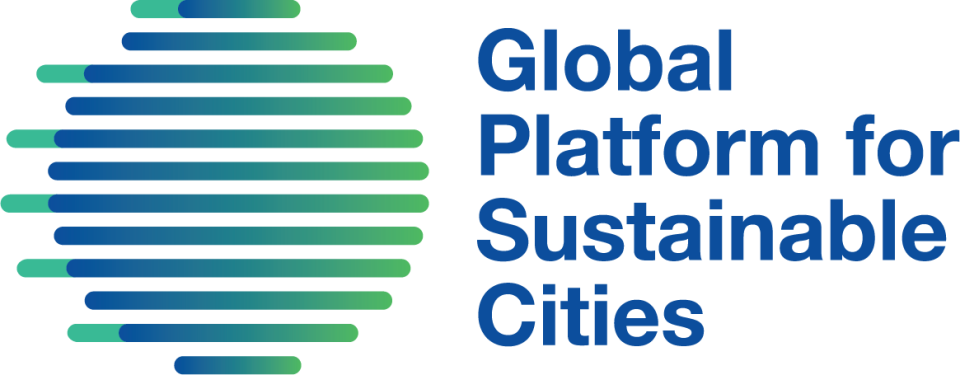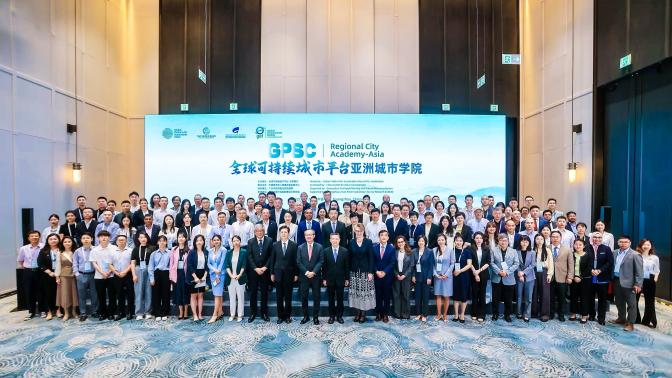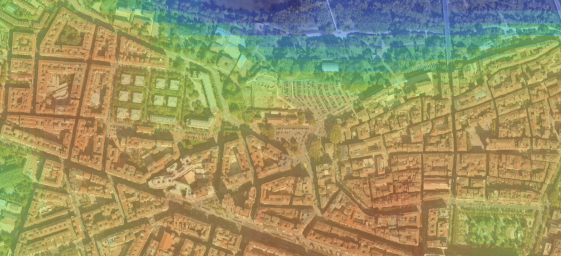BACKGROUND
GPSC and its Regional City Academy
The Global Platform for Sustainable Cities (GPSC), led by the World Bank and funded by the Global Environment Facility (GEF), serves as a global knowledge platform that connects cities and partners across disciplines. It provides technical expertise, innovative tools, and a convening space for cities to tackle complex challenges arising from rapid urbanization and climate change. The Regional City Academy is a core initiative of the GPSC, conducted on a regular basis, to strengthen the operational capacity of city leaders and urban practitioners. This learning program offers practical training modules to equip participants with tools for managing sustainable urban development. It fosters the exchange of best practices, enables interactions with global experts, and supports participants in creating diagnostic reports and actionable plans to enhance urban performance.
GPSC First Regional City Academy – Asia
The first Regional City Academy was co-organized with the China Center for Urban Development (CCUD) in collaboration with the Guangzhou Municipal Planning and Natural Resources Bureau and with support from the Guangzhou Urban Planning and Survey Research Institute (GZPI), and took place in Guangzhou, China, in conjunction with the Infra4Dev Conference.
The Regional City Academy focused on the unique needs of Asian cities, where rapid urbanization has presented opportunities and challenges. Cities across Asia face significant climate risks, urban flooding, and resource constraints, while also striving to transition toward low-carbon and resilient growth. This Academy provided a platform for city leaders to share experiences and co-develop strategies for achieving resilient, low-carbon, and inclusive urban development.
Guangzhou, one of China’s leading megacities, exemplifies innovative urban practices, such as building green and blue infrastructure to enhance urban resilience and sponge city initiatives for flood management, making it an ideal venue to showcase real-world solutions for sustainable urban growth. Click on these links to download the agenda (in Chinese and English) and the photos of the event.
OVERVIEW OF KEY THEMES AND TOPICS
Theme 1: Blueprint for Tomorrow – Planning for Urban Resilience
Cities in Asia are facing increasing climate risks, resource constraints, and rapid urban growth. Urban planning plays a pivotal role in integrating resilience and sustainability into land use planning and city development strategies. This session explores key frameworks, policy tools, and planning approaches that help cities align urban expansion with climate adaptation and decarbonization goals. The key topics are:
- Strategic land use planning – embedding urban growth, economic development, low carbon, and resilience into master plan and long-term city growth strategy
- Tools for climate-smart urban development – scenario planning, risk assessment, and policy instruments
- Institutional coordination – fostering cross-sector collaboration for climate action
Theme 2: Nature in the City – Building Green and blue Infrastructure to enhance urban resilience
Nature-based solutions offer cost-effective ways to enhance urban resilience, reduce climate risks, and improve livability. This theme focuses on how cities can integrate green and blue infrastructure, such as sponge city initiatives for flood management, passive solutions for managing urban heat, and green corridors for enhancing urban biodiversity. Participants will explore practical tools, financing mechanisms, and governance structures that enable cities to harness nature for sustainable urban growth. The key topics are:
- Sponge city principles – designing cities that absorb, store, and reuse water
- Green-blue infrastructure for managing urban heat – case studies on urban cooling, including neighborhood regeneration
- Green corridors for urban biodiversity
- Policy and financial enablers – integrating nature-based solutions into urban investments
PRESENTATIONS
|
DAY 1 – MAY 12 |
|
Keynote speech 1: Responding to climate change: urban resilience and green and low-carbon development. LI Xiaojiang, Former Dean of China Academy of Urban Planning and Design, China Master of Engineering Survey and Design
Keynote speech 2: China National Spatial Planning Strategy for Ecology and Resources. XU Xiaoli, Deputy Director General, National Land and Space Planning Research Center of the Ministry of Natural Resources, China
Regional Planning – Path and Innovative Practice of the Yangtze River Delta Ecological Green Integration Demonstration Zone. CAI Yongli, Professor, School of Design, Shanghai Jiao Tong University
City Introduction. City Representatives from Malaysia, Mongolia, Nepal, Philippines, Sri Lanka, Singapore, China and Colombia.
Guangzhou Practice: Territorial and Spatial Planning and Green Development. Jiang Li, Deputy Director General, Guangzhou Municipal Planning and Natural Resources Bureau
Singapore Green Master Plan. Ng Boon Gee, Group Director, National Parks Board, Singapore
Strategies For Strengthening and Structuring the Role of Vegetation in Paris and the Greater Paris Metropolis. Patricia Pelloux, Deputy Director, Paris Urban Planning Agency. Yann Fanch Vauléon, Landscape Designer, Paris Urban Planning Agency
|
|
DAY 2 – MAY 13 |
|
Keynote Presentation: Nature in the City. Till Rehwaldt, Founder of Rehwaldt Landscape Architects
Panyu, Guangzhou: Green Infrastructure Investment Framework. Part 1 LIU Yanjing, Rehwaldt Landscape Architects. Part 2. WU Jie, Guangzhou Urban Planning & Design Survey Research institute
New York and Amsterdam: City Practice. Professor Matthijs Bouw, Weitzman School of Design, University of Pennsylvania
Shanghai: Megacity Environmental Governance in Shanghai: From Basic Security Safeguarding to Ecological Coexistence. WANG Selan, President, Board Chairman of Shanghai Environment Group Co., Ltd. (the listed environment subsidiary of Shanghai Chengtou Group)
Natural capital accounting for urban green and blue assets. HAN Baolong, Research Center for Eco-environmental Sciences, Chinese Academy of Science
Tools used to develop green infrastructure investment framework in cities in Turkiye and Haizhu Wetland Natural Capital Accounting. Xueman Wang, GPSC Program Manager, World Bank
Unpacking Urban Ecology: Insights from Guangzhou's Ecosystem Monitoring System and Practices. LI Zhiqi, Division Director, Guangzhou Forestry and Landscape Science Research Institute
Integration of ecological functions into landscape and project design. Bruno Marques, President of International Federation of Landscape Architects. Li Xiong, Vice President of Beijing Forestry University, Vice President of Chinese Society of Landscape Architecture. Paul Chan, President of the Hong Kong Institute of Landscape Architects
Integrating Green Infrastructure into Neighborhood Regeneration and GEF7 pilots. Xueman Wang, GPSC Program Manager, World Bank
Short Introduction to Haizhu Wetland. WANG Xiaobing, Guangzhou Urban Planning & Design Survey Research Institute
|
|
DAY 3 – MAY 14 |
|
Research and Application of Integrated Urban Water Retention, Drainage, and Flood Control Systems. LIU Guangqi, Deputy Director of Water Treatment Institute, China Academy of Urban Planning and Design
Sponge City: Climate Resilience & Nature-based Holistic Solutions. WANG Dong, Director-General, Eco-city Design Center, Turenscape
Challenges and solutions in addressing urban flooding in the City of Bogota. Vanessa Alexandra Velasco Bernal, Habitat Chief Secretary, City of Bogota
Nature and Green urban infrastructure in GEF8 Participating cities: China, Malaysia, Mongolia, Philippines, and Sri Lanka
|







